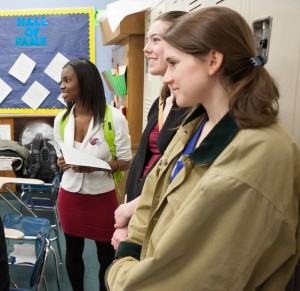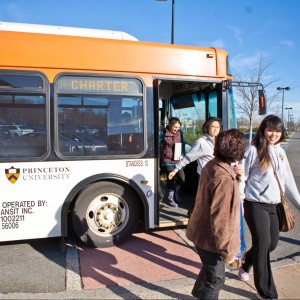With Dean’s Date barely behind us and thoughts of grades consuming every waking moment, it is easy to forget the real-world value of our courses. But, at the same time, it is not hard to find research opportunities that transcend the classroom and have clear consequences beyond your GPA.
Last semester, my roommate Morgan, a sophomore concentrating in Anthropology and pursuing a Global Health Certificate, participated in such a research opportunity through the Community-Based Learning Initiative (CBLI). I decided to interview Morgan for my PCUR post this week so that she can share her experience and inform other students about impactful research opportunities on and off campus.

Me: What is the Community-Based Learning Initiative and what was your involvement with it?
Morgan: CBLI is a Princeton program that partners with businesses and organizations in the local community to help students explore real world applications of the material they learn in their classes. My involvement was through a course on medical anthropology (ANT 335) that I took in the spring of 2015. I wrote my final paper on New Jersey’s Physician’s Order for Life-Sustaining Treatment (POLST), which was being implemented at St. Francis Medical Center.
Me: Did you go off campus for your research?
Morgan: Yes, we drove to St. Francis Medical Center in Trenton and we met with the Director of Religious Life to discuss end-of-life care planning, palliative care, the history of advanced directives and how cultural norms factor into end-of-life planning.
Me: How was CBLI different from other research projects you have done at Princeton?
Morgan: As opposed to past research I’ve done, CBLI gave me the opportunity to have a much more dynamic relationship with the topic I was studying since I was able to talk to medical professionals and witness the effects of the POLST program roll-out. The papers we wrote about the project were used to inform the continued implementation of the POLST program, so the research process was much more dialectic than I was used to; we were learning from our research subjects and ultimately they were learning from us as well.
“The research process was much more dialectic than I was used to; we were learning from our research subjects and ultimately they were learning from us as well.”

Me: What did you like most about CBLI?
Morgan: I enjoyed the way that it allowed us to get real-life insight into not only end-of-life planning, but also the particular ways that a Catholic medical center handles preparing for death with its patients. It was engaging to see how the topics we covered in class were applied outside of the classroom and reinterpreted in terms of the the medical center’s specific role and values.
Me: How has your experience with CBLI affected the way that you approach other research projects?
Morgan: CBLI really underscored the value of interviewing professionals in the relevant field. A lot of the time research can happen behind a screen in a library, but it is incredibly helpful to have a face-to-face discussion with experts who are fully immersed in the projects you are studying. CBLI showed me the importance of both formal and informal interviews as a means of collecting data. Even though such interviews can involve far more planning, preparation and logistical details than reading a book or article, I often find them to be exceptionally helpful as well as exciting. Now whenever I’m working on a research project, I always look for interview opportunities with relevant experts.
“CBLI showed me the importance of both formal and informal interviews as a means of collecting data.”
Me: Have you had any involvement with CBLI since the end of your medical anthropology class?
Morgan: I’m working with two other students to start a Habitat for Humanity chapter at Princeton and we met with CBLI to discuss potential collaborations. We would like to partner with Urban Studies or Architecture classes and incorporate Habitat into their future curricula through CBLI. I think that it would be a great opportunity to engage students in hands-on, site-specific research while simultaneously having a meaningful impact on the local community.
~~~~~
If you are interested in learning more about CBLI, here is a description of the Spring 2016 projects. If you find one that interests you, it could be a remarkable opportunity to gain research experience and see how your undergraduate education extends beyond the Orange Bubble.
—Emma Kaeser, Social Sciences Correspondent

